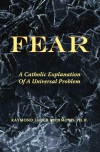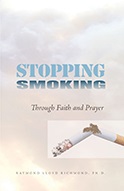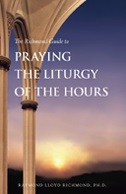|
|
|
|
If the
cross is loved, it is easy to bear.
|
—Saint Teresa of Avila
Meditations on the Song of Songs, 2. 26 |
Fear |
Healing |
Therapy |
Spiritual Counsels |
Books |
About CSF
The Way of the Cross |
Parables |
A World Filled With Impiety |
Psychology and Spirituality |
Asking While Doubting |
Sacrifice, Obedience, and Prayer |
Where Has Love Gone? |
What You Can Do |
Increase My Faith |
With Trials As A Teacher |
It’s That Simple
 IVING
a devout Christian life, in general,
does not require any great intellectual skills. Christ, after all, had no
need for Plato and Aristotle in order to preach about surrendering to God
in pure love. True religion is a matter of heart
and will, not of reason. The essence of Christianity is not in feeling
good about ourselves or
feeling special because of
what we know or who we know or
who we think we are; the essence of Christianity is in sacrificing
ourselves in every moment through pure love
so that we, and others for whom we pray, might be saved from
sin. And, for that matter, that’s why Christ
preached in parables: to bypass the intellect and pierce right into our hearts
and souls. IVING
a devout Christian life, in general,
does not require any great intellectual skills. Christ, after all, had no
need for Plato and Aristotle in order to preach about surrendering to God
in pure love. True religion is a matter of heart
and will, not of reason. The essence of Christianity is not in feeling
good about ourselves or
feeling special because of
what we know or who we know or
who we think we are; the essence of Christianity is in sacrificing
ourselves in every moment through pure love
so that we, and others for whom we pray, might be saved from
sin. And, for that matter, that’s why Christ
preached in parables: to bypass the intellect and pierce right into our hearts
and souls.
Parables
In the Parable of the Sower
(Matthew 13:1-9; Mark 4:1-9; Luke 8:4-8), Christ poignantly described
what would happen to the very Word He preached.
• |
Some persons, because of
indifference, ingratitude, and contempt, reject
the Word even as they hear it and refuse to believe.
Their hearts are like hard rock. |
• |
Some persons accept the Word
intellectually and think they believe. But when trials afflict them
they fly into a panic, abandon patience and
prayer, and attempt to get satisfaction and
revenge with their own hands—all because they
have not set the roots of faith deep into their heart and will. |
• |
Some persons accept the Word
in faith but then allow the attractions of the world
to overgrow their lives and choke out the fruits of faith. |
Christ also spoke about the
Parable of the Weeds among the Wheat (Matthew 13:24-30), in which
He described how evildoers and those who cause others to sin will co-exist
with the faithful until the final judgment when the weeds will be
burned.
A World Filled
with Impiety
So in today’s world—filled
as it is with anti-Christian lore and soaked in
impiety and heresy—if you don’t apply
yourself to serious study and prayer
in order to disentangle the truth from all the lies that have been sown over
centuries of disobedient self-indulgence, you
are in grave danger of ending up in the fire with
all the weeds.
Therefore, anyone who claims
that being a Christian in today’s world is “easy” has sadly
failed to understand a basic point about Christianity: the world hates true
Christianity because Christ places restrictions on the world’s
narcissistic self-enjoyment. Thus there is no culture,
anywhere, that is pure; all cultures are filled with lies and
fraud in one way or another. There is only one
truth: Christ.
 The preacher of God’s
truth has told us that all who want to live righteously in Christ will suffer
persecution. If he spoke the truth and did not lie, the only exception to
this general statement is, I think, the person who either neglects, or does
not know how, to live temperately, justly and righteously in this
world. The preacher of God’s
truth has told us that all who want to live righteously in Christ will suffer
persecution. If he spoke the truth and did not lie, the only exception to
this general statement is, I think, the person who either neglects, or does
not know how, to live temperately, justly and righteously in this
world.
May you never be numbered among those whose house is peaceful, quiet and
free from care; those on whom the Lord’s chastisement does not descend;
those who live out their days in prosperity, and in the twinkling of an eye
will go down to hell. |
—From a letter by Saint Raymond
(Office of Readings, January 7: Raymond of Penyafort, Priest) |
And, I will add, there are many
bishops and priests in the world today who, in the twinkling of an eye, will
go down to hell simply because they have neglected
Christ’s command to “feed My sheep”—yes, they have been
feeding His sheep, but they have been feeding them to the wolves.
Psychology and
Spirituality
But do you really need a psychologist
to teach you how to live a Christian spiritual life? The truth is,
 both
Saint John of the Cross and Saint Teresa of Avila had uncanny psychological
insight into the workings of the mind and heart, both
Saint John of the Cross and Saint Teresa of Avila had uncanny psychological
insight into the workings of the mind and heart,
 and
yet neither had any formal training in psychology, because psychology
didn’t even exist as a science in their time. and
yet neither had any formal training in psychology, because psychology
didn’t even exist as a science in their time.
This just goes to show that genuine
mystic spirituality ultimately leads to accurate psychological insight. And
it also shows that those who write or preach about
spirituality while misunderstanding psychology—as
in advocating a sentimental desire for happiness
and self-fulfillment—don’t really
have any wisdom.
|
But if any of
you lacks wisdom, he should ask God who gives to all generously and ungrudgingly,
and he will be given it. But he should ask in faith, not doubting, for the
one who doubts is like a wave of the sea that is driven and tossed about
by the wind. For that person must not suppose that he will receive anything
from the Lord, since he is a man of two minds, unstable in all his
ways. |
|
|
—James 1:5–8 |
|
Those who doubt, then, will find that
prayer alone does not help them, and that they need modern
Catholic psychotherapy.
Asking While
Doubting
What, then, does it mean to ask
while doubting?
Well, realize that once you choose
to live a devout spiritual life you step onto a path that leads out of the
city and right to your own crucifixion. You have to walk out knowing you
will never come back. If you turn back, there
is nothing but hell. And if you begin to doubt
and hesitate and look to the world to sustain
your identity, rest assured that the cross won’t come to get
you—but the devil himself will soon show up, wearing a nice tuxedo,
holding the door to his limousine, just for you.
Sacrifice, Obedience,
and Prayer
Many persons come to a psychologist
complaining of the pain they suffer at the hands of another. My friends
neglect me. Lovers abuse me. My husband is unfaithful. My wife is critical.
My children are disobedient. And most of them balk when they hear that
the only way they can find genuine healing is to
accept responsibility for their part in all the
suffering around them.
 Except for very young
children abused by their parents (or other adults), no one is innocent
psychologically. We all share responsibility for everything
that happens around us. A wife may not have caused her husband to have an
affair, but perhaps she dreaded the warning signs along the way and shrank
back from doing anything about them. The teenage boy may not have caused
his abusive father to beat him, but perhaps, in his anger over his mother’s
divorce, he provoked his father with
disobedience. Except for very young
children abused by their parents (or other adults), no one is innocent
psychologically. We all share responsibility for everything
that happens around us. A wife may not have caused her husband to have an
affair, but perhaps she dreaded the warning signs along the way and shrank
back from doing anything about them. The teenage boy may not have caused
his abusive father to beat him, but perhaps, in his anger over his mother’s
divorce, he provoked his father with
disobedience.
And so, whether through timidity
or through provocation, we contribute to the suffering around us. And we
don’t like it when someone shows us that fact.
But Christ showed it to us
anyway.
He showed it in His Body and
Blood; the Apostles proclaimed it; the mystics through the ages have confirmed
it: If we want peace in our hearts, we cannot escape our responsibility to
others around us. Remember My Passion, and if you do not believe My words,
at least believe My wounds.
Christ Himself took full
responsibility for the world’s suffering by taking it all on Himself.
And He called us to do the same. And we crucified Him for it.
Thus, for those who repent the
fact that during His bitter Passion we all tore at His Body and
Heart, only one trinitarian action can lead
to genuine healing and peace: sacrifice, obedience, and
prayer.
| • |
Sacrifice
(which means to make holy) can be expressed as suffering and fasting.
Fasting, in its literal sense, means to do without our accustomed food
so that in feeling physical hunger we might be aware of the presence of God and
recognize a spiritual hunger for holiness; suffering, in its literal sense,
means to endure pain that we may have done nothing to deserve. But the broad sense of
sacrifice means that we must “fast” from what we don’t really need, so
as to achieve spiritual purification, thus enabling us to “suffer” in giving to
others what they need spiritually. In other words, we must
give up the psychological defenses that protect
us from feeling unloved by the social world so that we can give
true love to others. If we feel the pain of all the
sins of the world, including our own, and if we
bear that pain patiently, and if we offer our
patient acceptance of suffering as our own daily
“fasting,” then other souls might turn back to God because of our constant
sacrifices for them.
You shall accept
all sufferings with love. Do not be afflicted if
your heart often experiences repugnance and dislike for sacrifice. All its
power rests in the will, and so these contrary feelings, far from lowering
the value of sacrifice in My eyes, will enhance it.
—as told to Saint Faustina,
Diary, 1767 |
|
| • |
Obedience
can also be thought of as our call to charity and mercy, for
Christ Himself, who in His love for us obediently
died on a cross for our redemption, commanded
us to love others as He has loved us. |
| • |
Prayer
refers to our unceasing communion with God. Because our lives belong
to God, not to ourselves, we must dwell in God’s presence in every moment
of our lives. We must pray constantly for God’s
mercy, for nothing else in life has any
enduring meaning. And we must pray for the
repentance and conversion of anyone who
injures or insults us, lest our lives remain stuck in resentment, bitterness, and
vengeance. |
Where Has Love
Gone?
I’ve seen it over and over
again, in church and in my office: people are all smiles and devotional behavior
on the surface, but once they are pushed the slightest bit against their
own will they become very hostile, very quickly.
|
In the church,
they hear about horrific tortures inflicted on the martyrs—beatings,
stabbings, bodies torn apart and burned. They pray to find strength from
the martyrs’ courage and to rejoice in the martyrs’ triumph. Then,
no sooner have they left the church than they experience a tiny pinprick
of an insult or inconvenience, and they fly into a rage. What happened to
the prayers that were on their lips just moments ago? Where have all the
martyrs gone? Where has love gone? |
|
For most people, love is
just an intellectual concept—a surface scratch. So understand that love
doesn’t get real until, as an expression of sacrifice, obedience,
and prayer, it rips right into your
heart.
|
Many persons
shopping for a spiritual life will inquire of the Catholic Church, “This
wisdom and peace you offer—how much does it cost?”
The reply is simple and straightforward:
“Everything you have—all your heart, and all your soul, and all
your mind, and all your strength.”
They shake their heads. “No, that’s too
expensive. We want something the ordinary person can afford.”
|
|
What You Can
Do
Here’s what you can do,
then, to discover real love:
Deny
yourself. Do what Christ told us all
to do. Stop seeking your own pleasure and your own imaginary
identity; instead, follow the
spiritual counsels so that you will be in a proper
state of mind and heart to perceive—and receive—the graces that
God sends you. In this way you will be able to recognize and repent your
own sins while assisting others to recognize and repent their
sins.
|
When Christ and
the Apostles found themselves with only a few loaves of bread and one fish,
in the midst of thousands of hungry people, Christ could have said to the
Apostles, “Just enjoy what you have; the others can fend for
themselves.” But no. Instead, He proceeded to give away what He had
and, in the process, multiplied it. In a similar way, when you make sacrifices,
you don’t deprive yourself of anything; instead, you multiply
love. |
|
Learn
to pray. As you pare away worldly
distractions, turn to prayer for true sustenance.
But understand that unless you learn to surrender
yourself totally, renounce your own desires,
and follow the discipline of both vocal and mental prayer, the answers to
your prayers will most likely be your own wish-fulfillment fantasies,
not God’s will. Prayer is not something to be taken casually, or your
own
unconscious
psychology will lead you astray.
 Read.
Read and study
as if your life depended on it, because it does. It is important to study the
truth so as to protect yourself from getting infected by the
indifference, ingratitude, and contempt of
the corrupt world around you. As you are learning
to pray, begin reading a spiritual classic that many have read and few have
taken seriously: the Imitation of Christ. Read it straight through
once, quickly, but thereafter open it at random and read bits of it in depth,
as a sort of daily guidance, while reading the other books, including the
Bible. Read.
Read and study
as if your life depended on it, because it does. It is important to study the
truth so as to protect yourself from getting infected by the
indifference, ingratitude, and contempt of
the corrupt world around you. As you are learning
to pray, begin reading a spiritual classic that many have read and few have
taken seriously: the Imitation of Christ. Read it straight through
once, quickly, but thereafter open it at random and read bits of it in depth,
as a sort of daily guidance, while reading the other books, including the
Bible.
Confess
your sins. Be careful, though,
not to look just at the surface of things. For example, if you have troubling
sexual temptations, you might confess merely that
you have troubling sexual temptations. But if you study this website
and realize that troubling sexual temptations are
an
unconscious
psychological way to comfort yourself when you feel weak or helpless or abandoned,
then you can confess the real problem: that you are prone to “take
matters into your own hands” when you feel weak or helpless or abandoned,
that you try to find your
identity
through the approval and acceptance of others, and that you avoid
bringing your fears directly to
God because you love the world more than you love God.
|
“I’m
not a psychologist,” a priest will say. And well said; it’s a fact.
And it’s also a sad excuse to hide the mistakes priests make in preaching
and in directing the confessional process. The truth is, if priests would go
beyond the norm—that is, if trad priests would go beyond liturgy and philosophy,
and if Novus Ordo priests would go beyond the realm of happy-clappy social
relationships—and take up deep spiritual lives of contemplative prayer, then
perhaps they might be true confessors able to offer help in understanding and
overcoming sins. |
|
Understand
humility. Understand love. Understand
that mystic Christianity is not a matter of knowledge for its own sake. It
is not a matter of intellectual prowess or of philosophy. It is not a matter
of arguing with others. It is not a matter of displaying your holiness for
others to see and admire. It is not a matter of visions and ecstasies. It
is simply a matter of emptiness of self and pure
love. Holiness is measured not with
“spiritual” feelings but with
obedience.
 |
To be taken with
love for a soul, God does not look on its greatness, but on the greatness
of its humility. |
—St. John of the Cross
The Sayings of Light and Love, no. 103. |
You can see visions, hear locutions,
and pray in tongues, but what good are these
things if they do not lead you into ever deeper
humility and ever greater acts of suffering and
self-sacrifice for the sake of mercy to others?
See yourself, then, as a nobody.
Put yourself at the service of all. Give all you have and be a living example
of that divine grace and glory you most ardently desire. Feel the pain and
the sadness of all the sin in the world around you,
but do not pay attention to what others
do—focus instead on your own yearning for chaste and humble purity
of heart. For just as sin is the punishment of sin, love is the reward of
love.
 Above all the graces and
all the gifts of the Holy Spirit which Christ grants to His friends, is the
grace of overcoming oneself, and accepting willingly, out of love for Christ,
all suffering, injury, discomfort and contempt; for in all other gifts of
God we cannot glory, seeing they proceed not from ourselves but from God,
according to the words of the Apostle, “What hast thou that thou hast
not received from God? and if thou hast received it, why dost thou glory
as if thou hadst not received it?” But in the cross of tribulation and
affliction we may glory, because, as the Apostle says again, “I will
not glory save in the cross of our Lord Jesus Christ.” Above all the graces and
all the gifts of the Holy Spirit which Christ grants to His friends, is the
grace of overcoming oneself, and accepting willingly, out of love for Christ,
all suffering, injury, discomfort and contempt; for in all other gifts of
God we cannot glory, seeing they proceed not from ourselves but from God,
according to the words of the Apostle, “What hast thou that thou hast
not received from God? and if thou hast received it, why dost thou glory
as if thou hadst not received it?” But in the cross of tribulation and
affliction we may glory, because, as the Apostle says again, “I will
not glory save in the cross of our Lord Jesus Christ.” |
—
The
Little Flowers of St. Francis of Assisi
Chapter VII |
Increase My
Faith
Just realize, though, that none
of this comes easily. If you pray, “Lord, increase my faith,”
don’t expect God to magically anoint you
with a large dose of faith. Instead, you will have
affliction after affliction heaped upon your head, and as you graciously
cope with it all through loving perseverance,
you will emerge from the struggle to find that your
faith has, indeed, increased.
With Trials as
a Teacher
You might wonder why some persons
grow to such great spiritual heights and why others make so little progress.
Well, Saint John of the Cross explains it.
|
 And here it ought to be pointed
out why so few reach this high state of perfect union with God. It should
be known that the reason is not that God wishes only a few of these spirits
to be so elevated; He would rather want all to be perfect, but He finds few
vessels that will endure so lofty and sublime a work. . . .
There are many who desire to advance and persistently beseech God to bring
them to this state of perfection. Yet when God wills to conduct them through
the initial trials and mortifications, as is necessary, they are unwilling
to suffer them and they shun them, flee from the narrow road of life [Mt.
7:14] and seek the broad road of their own consolation, which is that of
their own perdition [Mt. 7:13]; thus they do not allow God to begin to grant
their petition. They are like useless containers, for although they desire
to reach the state of the perfect they do not want to be guided by the path
of trials that leads to it.” And here it ought to be pointed
out why so few reach this high state of perfect union with God. It should
be known that the reason is not that God wishes only a few of these spirits
to be so elevated; He would rather want all to be perfect, but He finds few
vessels that will endure so lofty and sublime a work. . . .
There are many who desire to advance and persistently beseech God to bring
them to this state of perfection. Yet when God wills to conduct them through
the initial trials and mortifications, as is necessary, they are unwilling
to suffer them and they shun them, flee from the narrow road of life [Mt.
7:14] and seek the broad road of their own consolation, which is that of
their own perdition [Mt. 7:13]; thus they do not allow God to begin to grant
their petition. They are like useless containers, for although they desire
to reach the state of the perfect they do not want to be guided by the path
of trials that leads to it.” |
|
|
—Saint John
of the Cross
The Living
Flame of Love, Stanza 2.27 |
|
It’s That Simple
It’s that simple—and
that demanding. Which is why you will see so many “Christians”
happily waving to you from their limos as they ride by.


Healing
|
Though
Demons
Gloat
|
Anger
&
Forgiveness
|
Falling
Families,
Fallen Children
|
Disasters
and
trauma
|
Psychology
from the
Heart
|
 |
 |
 |
 |
 |
 |
Psychological Healing
in the Catholic Mystic tradition |
True Christian
Identity
In Confronting
Evil |
How to Turn the
Emotional Wounds
of Daily Life Into
Psychological Growth. |
The Psychological
and
Spiritual Remedy
For Our Cultural
Disintegration |
The Struggle For
Psychological
and Spiritual
Growth |
Collected Texts
About the Spiritual Depth of
Clinical Psychology |
More information |
More information |
More information |
More information |
More information |
More information |
Desire
and
Distraction
|
Fear
|
Stopping
Smoking
|
Borderline
Personality
Disorder
|
Catholic
Compassion
|
Reverence
for the
Holy Eucharist
|
 |
 |
 |
 |
 |
 |
A Catholic Perspective
On Behavioral Change
and Its Subversion |
A Catholic Explanation
Of a Universal
Problem |
Through
Faith
and
Prayer |
Healing
the
Rage |
When They Tell You
That the Moral Teachings of the
Catholic Church
Are Wrong |
Reverent and
Proper Conduct in
a Catholic Church |
More information |
More information |
More information |
More information |
More information |
More information |
|




 The preacher of God’s
truth has told us that all who want to live righteously in Christ will suffer
persecution. If he spoke the truth and did not lie, the only exception to
this general statement is, I think, the person who either neglects, or does
not know how, to live temperately, justly and righteously in this
world.
The preacher of God’s
truth has told us that all who want to live righteously in Christ will suffer
persecution. If he spoke the truth and did not lie, the only exception to
this general statement is, I think, the person who either neglects, or does
not know how, to live temperately, justly and righteously in this
world. both
Saint John of the Cross and Saint Teresa of Avila had uncanny psychological
insight into the workings of the mind and heart,
both
Saint John of the Cross and Saint Teresa of Avila had uncanny psychological
insight into the workings of the mind and heart,
 and
yet neither had any formal training in psychology, because psychology
didn’t even exist as a science in their time.
and
yet neither had any formal training in psychology, because psychology
didn’t even exist as a science in their time.
 Except for very young
children abused by their parents (or other adults), no one is innocent
psychologically. We all share responsibility for everything
that happens around us. A wife may not have caused her husband to have an
affair, but perhaps she dreaded the warning signs along the way and shrank
back from doing anything about them. The teenage boy may not have caused
his abusive father to beat him, but perhaps, in his anger over his mother’s
divorce, he provoked his father with
Except for very young
children abused by their parents (or other adults), no one is innocent
psychologically. We all share responsibility for everything
that happens around us. A wife may not have caused her husband to have an
affair, but perhaps she dreaded the warning signs along the way and shrank
back from doing anything about them. The teenage boy may not have caused
his abusive father to beat him, but perhaps, in his anger over his mother’s
divorce, he provoked his father with
 Read.
Read.
 Above all the graces and
all the gifts of the Holy Spirit which Christ grants to His friends, is the
grace of overcoming oneself, and accepting willingly, out of love for Christ,
all suffering, injury, discomfort and contempt; for in all other gifts of
God we cannot glory, seeing they proceed not from ourselves but from God,
according to the words of the Apostle, “What hast thou that thou hast
not received from God? and if thou hast received it, why dost thou glory
as if thou hadst not received it?” But in the cross of tribulation and
affliction we may glory, because, as the Apostle says again, “I will
not glory save in the cross of our Lord Jesus Christ.”
Above all the graces and
all the gifts of the Holy Spirit which Christ grants to His friends, is the
grace of overcoming oneself, and accepting willingly, out of love for Christ,
all suffering, injury, discomfort and contempt; for in all other gifts of
God we cannot glory, seeing they proceed not from ourselves but from God,
according to the words of the Apostle, “What hast thou that thou hast
not received from God? and if thou hast received it, why dost thou glory
as if thou hadst not received it?” But in the cross of tribulation and
affliction we may glory, because, as the Apostle says again, “I will
not glory save in the cross of our Lord Jesus Christ.”
















